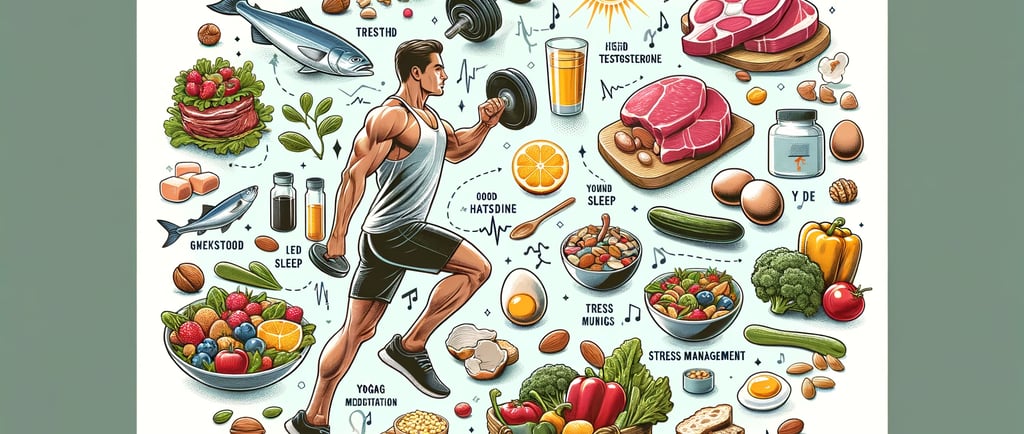How High Testosterone Levels Come from a Healthy Diet and Lifestyle
Understanding Testosterone
HEALTH


How High Testosterone Levels Come from a Healthy Diet and Lifestyle
Testosterone is a crucial hormone that plays a vital role in many bodily functions, including muscle mass, bone density, red blood cell production, and sexual health. While testosterone levels naturally decline with age, maintaining a healthy diet and lifestyle can significantly support and even boost testosterone production. Here’s how you can optimize your testosterone levels through diet and lifestyle choices.
Understanding Testosterone
Testosterone is a steroid hormone primarily produced in the testicles in men and in smaller amounts in the ovaries in women. It is responsible for developing male characteristics, but it also plays essential roles in women’s health.
The Role of Diet in Testosterone Levels
A balanced diet rich in essential nutrients is critical for maintaining optimal testosterone levels. Here’s how different dietary components influence testosterone production:
Protein
Lean Meats and Fish: Consuming adequate protein from sources like lean meats, fish, and eggs can help maintain muscle mass and promote healthy testosterone levels.
Plant-Based Proteins: Beans, lentils, and nuts are excellent sources of protein for those following a vegetarian or vegan diet.
Healthy Fats
Monounsaturated and Polyunsaturated Fats: Healthy fats found in avocados, nuts, seeds, and olive oil can support testosterone production.
Omega-3 Fatty Acids: Fatty fish like salmon, mackerel, and sardines are rich in omega-3 fatty acids, which have been linked to increased testosterone levels.
Vitamins and Minerals
Vitamin D: Often referred to as the "sunshine vitamin," vitamin D is essential for testosterone production. Foods like fatty fish, fortified dairy products, and egg yolks are good sources, but regular sun exposure is also important.
Zinc: This mineral is crucial for testosterone synthesis. Foods rich in zinc include oysters, red meat, poultry, beans, and nuts.
Magnesium: Magnesium helps regulate testosterone levels. Leafy green vegetables, nuts, seeds, and whole grains are excellent sources.
Carbohydrates
Whole Grains: Carbohydrates are important for providing energy. Opt for whole grains like brown rice, oats, and quinoa to maintain balanced blood sugar levels and support hormone production.
Fruits and Vegetables: A diet rich in fruits and vegetables provides essential vitamins, minerals, and antioxidants that support overall health and hormone balance.
The Role of Lifestyle in Testosterone Levels
In addition to diet, several lifestyle factors can significantly impact testosterone levels:
Regular Exercise
Strength Training: Resistance training and weightlifting are highly effective in boosting testosterone levels. Aim for a routine that targets all major muscle groups.
High-Intensity Interval Training (HIIT): HIIT workouts can also increase testosterone. Incorporate short bursts of intense exercise followed by periods of rest.
Adequate Sleep
Quality Sleep: Poor sleep quality and insufficient sleep can lower testosterone levels. Aim for 7-9 hours of quality sleep per night to support hormone production.
Sleep Hygiene: Maintain a regular sleep schedule, create a restful environment, and avoid screens before bedtime to improve sleep quality.
Stress Management
Reduce Stress: Chronic stress elevates cortisol levels, which can negatively impact testosterone. Engage in stress-reducing activities like yoga, meditation, and deep breathing exercises.
Relaxation Techniques: Practices such as mindfulness and progressive muscle relaxation can help manage stress levels effectively.
Healthy Weight Management
Maintain a Healthy Weight: Excess body fat, particularly around the abdomen, can lower testosterone levels. A balanced diet and regular exercise can help maintain a healthy weight.
Avoid Extreme Diets: Severe caloric restriction or fad diets can negatively affect hormone balance. Aim for a sustainable, balanced diet.
Avoid Harmful Substances
Limit Alcohol Consumption: Excessive alcohol intake can reduce testosterone levels. Moderation is key.
Quit Smoking: Smoking has been linked to lower testosterone levels. Quitting smoking can improve overall health and hormone levels.
Conclusion
High testosterone levels are not solely dependent on age or genetics; they are significantly influenced by diet and lifestyle choices. A balanced diet rich in protein, healthy fats, vitamins, and minerals, combined with regular exercise, adequate sleep, stress management, and avoiding harmful substances, can help maintain and even boost testosterone levels.



